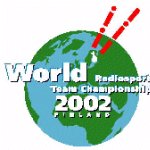Related Research Articles

Morse code is a method used in telecommunication to encode text characters as standardized sequences of two different signal durations, called dots and dashes, or dits and dahs. Morse code is named after Samuel Morse, one of the inventors of the telegraph.

Wireless telegraphy or radiotelegraphy is transmission of text messages by radio waves, analogous to electrical telegraphy using cables. Before about 1910, the term wireless telegraphy was also used for other experimental technologies for transmitting telegraph signals without wires. In radiotelegraphy, information is transmitted by pulses of radio waves of two different lengths called "dots" and "dashes", which spell out text messages, usually in Morse code. In a manual system, the sending operator taps on a switch called a telegraph key which turns the transmitter on and off, producing the pulses of radio waves. At the receiver the pulses are audible in the receiver's speaker as beeps, which are translated back to text by an operator who knows Morse code.
The Q-code is a standardised collection of three-letter codes that each start with the letter "Q". It is an operating signal initially developed for commercial radiotelegraph communication and later adopted by other radio services, especially amateur radio. To distinguish the use of a Q-code transmitted as a question from the same Q-code transmitted as a statement, operators either prefixed it with the military network question marker "INT" or suffixed it with the standard Morse question mark UD.
A continuous wave or continuous waveform (CW) is an electromagnetic wave of constant amplitude and frequency, typically a sine wave, that for mathematical analysis is considered to be of infinite duration. It may refer to e.g. a laser or particle accelerator having a continuous output, as opposed to a pulsed output.
The American Radio Relay League (ARRL) is the largest membership association of amateur radio enthusiasts in the United States. ARRL is a non-profit organization, and was co-founded on April 6, 1914, by Hiram Percy Maxim and Clarence D. Tuska of Hartford, Connecticut. The ARRL represents the interests of amateur radio operators before federal regulatory bodies, provides technical advice and assistance to amateur radio enthusiasts, supports a number of educational programs and sponsors emergency communications service throughout the country. The ARRL has approximately 161,000 members. In addition to members in the US, the organization claims over 7,000 members in other countries. The ARRL publishes many books and a monthly membership journal called QST.
The Royal Naval Amateur Radio Society (RNARS) is a specialised group or club for amateur radio operators who have a link with maritime employment, such as members of a navy, merchant marine or similar employment. As such, RNARS has become a de facto international group for such people.

Radio Amateurs of Canada (RAC), known in French as Radio Amateurs du Canada, is the national association for Amateur Radio in Canada. It is a not-for-profit membership association with headquarters in Ottawa, Ontario, Canada, representing the interests of Amateur Radio all across Canada. Speaking on behalf of Canadian Radio Amateurs, RAC provides liaison with government agencies and carries the Amateur voice about regulatory and spectrum issues to the discussion table with government and industry leaders, nationally and internationally.
FOC may refer to:

Contesting is a competitive activity pursued by amateur radio operators. In a contest, an amateur radio station, which may be operated by an individual or a team, seeks to contact as many other amateur radio stations as possible in a given period of time and exchange information. Rules for each competition define the amateur radio bands, the mode of communication that may be used, and the kind of information that must be exchanged. The contacts made during the contest contribute to a score by which stations are ranked. Contest sponsors publish the results in magazines and on web sites.

Radiosport is formal competition among amateur radio operators in any of three amateur radio activities, ARDF, DXing, and Contesting. The Friendship Radiosport Games is an international multi-sport event that includes all three types of radiosport. Since 1977, the International Amateur Radio Union has sponsored the IARU HF World Championship. The World Radiosport Team Championship is another international competition.

A telegraphist, telegrapher, or telegraph operator is an operator who uses a telegraph key to send and receive the Morse code in order to communicate by land lines or radio.

American Morse Code — also known as Railroad Morse—is the latter-day name for the original version of the Morse Code developed in the mid-1840s, by Samuel Morse and Alfred Vail for their electric telegraph. The "American" qualifier was added because, after most of the rest of the world adopted "International Morse Code," the companies that continued to use the original Morse Code were mainly located in the United States. American Morse is now nearly extinct—it is most frequently seen in American railroad museums and American Civil War reenactments—and "Morse Code" today virtually always means the International Morse which supplanted American Morse.

In the United States, amateur radio licensing is governed by the Federal Communications Commission (FCC). Licenses to operate amateur stations for personal use are granted to individuals of any age once they demonstrate an understanding of both pertinent FCC regulations and knowledge of radio station operation and safety considerations. Applicants as young as five years old have passed examinations and were granted licenses.

Procedural signs or prosigns are shorthand signals used in Morse code radio telegraphy procedure, for the purpose of simplifying and standardizing radio communication protocol. They are separate from Morse code abbreviations, which consist mainly of brevity codes that convey messages to other parties with greater speed and accuracy.
The history of amateur radio, dates from the dawn of radio communications, with published instructions for building simple wireless sets appearing at the beginning of the twentieth century. Throughout its history, amateur radio enthusiasts have made significant contributions to science, engineering, industry, and social services. Research by amateur radio operators has founded new industries, built economies, empowered nations, and saved lives in times of emergency.
Amateur radio or ham radio is practised by more than 22,000 licensed users in India. The first amateur radio operator was licensed in 1921, and by the mid-1930s, there were around 20 amateur radio operators in India. Amateur radio operators played an important part in the Indian independence movement with the establishment of illegal pro-independence radio stations in the 1940s. The three decades after India's independence saw only slow growth in the number of operators until the then Prime Minister of India and amateur radio operator, Rajiv Gandhi (VU2RG), waived the import duty on wireless equipment in 1984. Since then, numbers have picked up, and as of 2007, there were more than 16,000 operators in the country. Amateur radio operators have played a vital role during disasters and national emergencies such as earthquakes, tsunamis, cyclones, floods, and bomb blasts, by providing voluntary emergency communications in the affected areas.

KPH is a coast radio station on the Pacific Coast of the United States. For most of the 20th century, it provided ship to shore communications including telegrams and marine telex service. The station discontinued commercial operation in 1998, but is operated occasionally as a historic service – its signal can be received over a large portion of the western hemisphere.

Amateur radio, also known as ham radio, is the use of the radio frequency spectrum for purposes of non-commercial exchange of messages, wireless experimentation, self-training, private recreation, radiosport, contesting, and emergency communications. The term "amateur" is used to specify "a duly authorized person interested in radioelectric practice with a purely personal aim and without pecuniary interest;" and to differentiate it from commercial broadcasting, public safety, or professional two-way radio services.
The CW Operators' Club, commonly known as CWops, is an international organization, in membership and management, for amateur radio operators who enjoy communicating using Morse Code. Its mission is to foster the use of CW, whether for contesting, DXing, traffic handling, or engaging in conversations. A CWops nominee must be capable of sending and receiving International Morse Code at no less than 25 words per minute using the English language and submit dues. CWops is an activity-based organization that sponsors many events. The CWops are dedicated to promoting goodwill and education to amateur radio operators throughout the world. Many members are notable contesters, DXers, and QRQ Morse Code operators.
In amateur radio, high-speed telegraphy (HST) is a form of radiosport that challenges amateur radio operators to accurately receive and copy, and in some competitions to send, Morse code transmissions sent at very high speeds. This event is most popular in Eastern Europe. The International Amateur Radio Union (IARU) sponsors most of the international competitions.